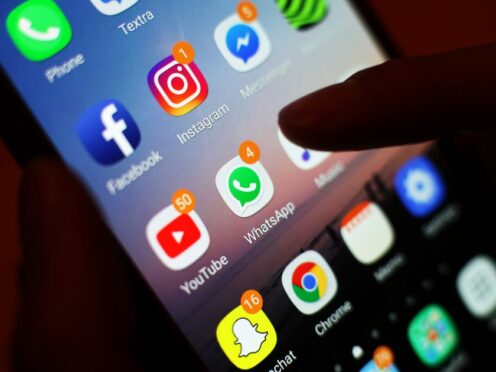
The Government should hold an inquiry into “dangerous” content which young people are able to access on their smartphones, the leader of the largest education union in the UK has said.
Daniel Kebede, general secretary of the National Education Union (NEU), warned of a “real problem” with sexism and misogyny in schools which has been fuelled by exposure to harmful content online.
Mr Kebede called on the Government to “take on” big technology companies as he said the problem is “too widespread” to be left to schools and parents.
He added that students are easily able to access social media influencers like Andrew Tate, as well as “aggressive hardcore pornography” which is affecting young boys’ views of women and relationships.
His comments came ahead of a debate on online misogyny and sexism at the NEU’s annual conference in Bournemouth.
A motion, due to be debated on Friday, says the “continued rise” in online sexism and misogyny through social media and online influencers presents a “real challenge” to those promoting gender equality.
It suggests the union’s resources to promote anti-sexism are “not being used as widely as they should” in schools and colleges.
Speaking to the media ahead of the debate, Mr Kebede said he has worked with young girls who have been victims of “significant acts of misogyny” and who have experienced abuse, violence and sexual assault.
He said: “That is being fuelled by a culture of misogyny and sexism that is in turn being fuelled by what young boys and young men can access on their smartphones. It’s really widespread.”
The Everyone’s Invited movement – a campaign on sexual harassment and abuse launched in 2021 – saw some pupils accuse their schools of failing to tackle a “rape culture”.
Asked whether the problem has got worse since the campaign, Mr Kebede said: “I don’t think anybody at the moment can view what’s happening in society and think the issue of sexism and misogyny – and what young people can access on their phones – has particularly improved. It hasn’t.”
He added: “It is very fair to say that there is a real problem with sexism and misogyny within schools. There is a real problem with what young people can access via their smartphone with real ease.
“It’s a problem that I think that Government have completely failed to intervene in. There has been no real regulation and it is causing a huge issue in our schools.”
Asked what the Government should do, the NEU chief said: “They need to actually take on big tech, if we are being honest.
“Big tech have to take some responsibility and be regulated and accept regulation and ensure that young people can’t access really aggressive, dangerous things on their phones.
“It’s not enough to just allow schools to police it, or parents indeed. It’s just far too widespread.
“I think there needs to be a real inquiry into this from Government which makes some recommendations on some significant reforms essentially.”
In February, schools in England were given non-statutory Government guidance intended to stop the use of mobile phones during school hours.
Last month, schools minister Damian Hinds told the Education Select Committee that getting a mobile phone between primary and secondary school has become a “rite of passage” for nearly all children.

Esther Ghey, the mother of murdered teenager Brianna Ghey, is campaigning for an age limit for smartphone usage and stricter controls on access to social media apps.
Asked whether parents could do more to restrict the content which their children are being exposed to online, Mr Kebede said: “Children and young people are very good at working out technology and how to use it and how to get around any filters and restrictions that are in place.
“We can’t individualise the issue and put it down to problem parenting, failure of parenting. It’s very difficult when every other child has access to a smartphone to be that parent who says no.
“There has to be regulation on this from Government, who in turn supports families in making those decisions.”
A Government spokesperson said: “All children deserve to grow up in a safe environment, and we expect schools to take immediate action against sexual misconduct or harassment.
“Through our world-leading Online Safety Act, social media firms will be required to protect children from being exposed to harmful material online, and the Education Secretary recently took robust action by prohibiting the use of mobile phones in schools.
“We are also reviewing the statutory guidance on relationships, sex and health education and as a part of this, we are considering how our guidance and support to schools on this issue can be strengthened.”

Enjoy the convenience of having The Sunday Post delivered as a digital ePaper straight to your smartphone, tablet or computer.
Subscribe for only £5.49 a month and enjoy all the benefits of the printed paper as a digital replica.
Subscribe